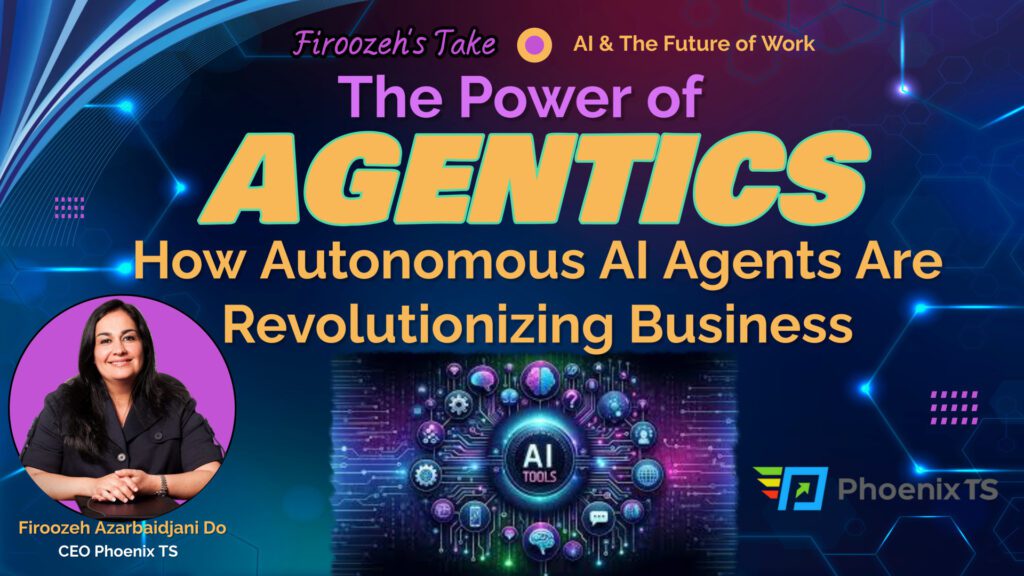
How Autonomous AI Agents Are Revolutionizing Business

Firoozeh Azarbaidjani Do
Owner, Phoenix TS and Information Technology and Services Consultant
April 23, 2025
The world of Artificial Intelligence is undergoing a dramatic shift, ushering in an era known as Agentics. More than just a buzzword, Agentics represents a groundbreaking leap forward, where AI agents evolve from passive tools to dynamic, autonomous entities. These agents don’t just follow commands; they plan, learn, and execute tasks independently, revolutionizing productivity, decision-making, and how humans interact with technology.
Agentics isn’t just theoretical anymore—it’s delivering measurable ROI, making businesses more efficient and cost-effective. Let’s explore how Agentics is shaping industries, the tools that can help you deploy your own AI agents, and where you can find resources to get started.
What Is Agentics?
At its core, Agentics is about empowering AI agents to act autonomously. Unlike traditional AI systems that require ongoing human input, AI agents can independently perceive their environment, analyze information, and make intelligent decisions to achieve specific goals. These agents are designed to minimize human intervention, taking on repetitive or complex tasks seamlessly.
Agentics combines machine learning, natural language processing, automation, and decision-making models to create AI systems capable of real-time action. This autonomy holds the potential to redefine workflows, slash operational costs, and unlock unrealized productivity gains.
Types of AI Agents in Agentics
AI agents come in various forms, tailored for different types of tasks. Understanding these categories will help you decide what works best for your needs:
- Reactive Agents: Handle simple, real-time tasks like sorting emails or triaging basic customer requests.
- Model-Based Agents: Useful in predictive scenarios like logistics planning or autonomous drones.
- Goal-Based Agents: Focused on specific outcomes, perfect for tools like project management software or creative assistants.
- Utility-Based Agents: Take decisions involving trade-offs, ideal for financial modeling or resource scheduling.
- Learning Agents: Adapt over time through trial and error, excelling in dynamic environments like cybersecurity or e-commerce.
Real-World Applications AI agents are already having a transformative impact across industries:
- Customer Support: AI agents are powering intelligent support bots that go beyond scripted responses. By analyzing past interactions and tone, they can provide human-like assistance and escalate issues when needed.
- Autonomous Research: Tools like Deep Research agents autonomously browse websites, evaluate sources, extract key data, and summarize findings. This saves countless hours in sectors like law, finance, and academia.
- Cybersecurity: Agents detect anomalies in network traffic, respond to threats in real time, and even launch countermeasures without human intervention. This is critical for protecting digital infrastructures at scale.
- Sales and Outreach: AI agents identify potential leads, send tailored outreach messages, follow up, and book meetings—acting like virtual SDRs (Sales Development Reps) and improving conversion rates.
- Healthcare: In clinical settings, AI agents help with early diagnosis, patient monitoring, and symptom triage, offering medical professionals critical support in managing growing patient loads.
Proven Results in Agentics
- The financial benefits of deploying AI agents are already evident across industries. Here are some real-world examples of businesses achieving substantial ROI through Agentics:
- eBay’s Customer Support Agents By deploying AI agents for customer support, eBay resolves 60% of queries without human involvement, leading to savings estimated at $5 million annually.
- Zendesk’s AI-powered Chatbots Companies using Zendesk’s AI tools report that agents reduce response time by 70% and improve customer satisfaction, translating into boosts in customer retention by as much as 18%.
- Healthcare Autonomy Remote patient monitoring systems using autonomous agents have reduced hospital readmissions by over 30%, saving hospitals and insurance companies millions of dollars annually in operational costs.
- Sales Automation with Agents Outreach.io uses AI agents to automate email campaigns, follow-ups, and scheduling. Customers report a 300% increase in lead conversions, equating to revenue increases of over $100,000 per quarter for mid-sized businesses.
Such results prove that investing in Agentics is not just futurism but a tangible, value-driven transformation.
Tools for Getting Started with AI Agents
For businesses and individuals, setting up AI agents may seem complex, but a variety of tools make it straightforward. Here are some solutions to consider:
- Auto-GPT and BabyAGI These open-source frameworks are perfect for building autonomous agents. Auto-GPT allows you to chain tasks independently, while BabyAGI incorporates memory to stay focused on long-term goals.
- Zapier and Make (formerly Integromat) These platforms enable you to automate workflows using pre-built AI integrations without deep technical expertise. For example, you can connect AI tools like OpenAI to handle routine business tasks.
- LangChain LangChain lets developers integrate large language models (LLMs) into dynamic applications. It’s a robust framework for building agents capable of retrieving knowledge, answering questions, and managing complex tasks.
- OpenAI’s Operator Operator is a powerful tool designed to execute multi-step tasks online autonomously. It integrates seamlessly with common business tools to handle scheduling, web navigation, and data entry.
- AgentCloud This enterprise-grade solution allows businesses to deploy scalable AI agents tailored to industry-specific tasks, such as customer support, logistics, or R&D.
The Future of Agentics
Agentics is poised to rewrite the rules of human-machine collaboration in profound ways. Its applications in industries like retail, finance, healthcare, and cybersecurity highlight its scalability and versatility. However, it also poses important ethical and governance questions. How do we ensure accountability, transparency, and moral alignment in autonomous systems? These considerations will inform the continued growth of Agentics.
What’s clear is that Agentics is no longer just a concept for early adopters. It’s a proven change agent delivering results today. Enterprises that adapt to this new paradigm will position themselves at the forefront of innovation, cost-efficiency, and customer experience. By investing in AI agents today, you’re building not just systems—but an intelligent, autonomous future.
Are you ready to step into the world of Agentics? The tools and knowledge are out there. Now, it’s up to you to unlock their potential.

